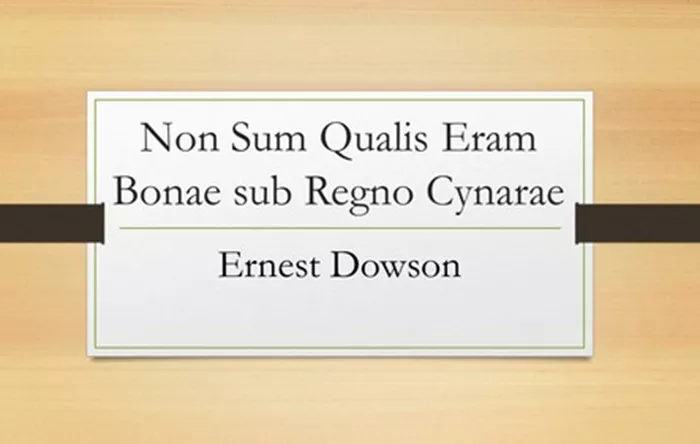Welcome to Poem of the Day – Non Sum Qualis Eram Bonae sub Regno Cynarae by Ernest Christopher Dowson
Today’s featured poem is Non Sum Qualis Eram Bonae sub Regno Cynarae by Ernest Christopher Dowson. This Latin title translates to “I am not as I was in the reign of the good Cynara.” The poem is one of Dowson’s most famous works. It captures deep emotions like love, loss, and regret. Through beautiful and haunting language, the poet expresses how a past love continues to haunt him.
Non Sum Qualis Eram Bonae sub Regno Cynarae Explanation
About the Poet
Ernest Christopher Dowson (1867–1900) was an English poet. He is often linked to the Decadent movement, a literary style known for emotional depth, romanticism, and melancholy. Dowson’s life was marked by personal tragedy and poor health. He died young, but his poems continue to move readers today. His work often explores themes of lost love, beauty, and sadness.
Overview of the Poem
The poem begins with the speaker saying he is no longer the man he once was. He used to love a woman named Cynara. Even though he tries to move on and forget her, her memory always returns. He spends time with other women. He even dances and drinks wine to distract himself. Still, deep inside, his heart belongs to Cynara.
The poem uses repetition and a musical rhythm to express longing. It shows the struggle of trying to forget someone while secretly still loving them.
Line-by-Line Explanation
Title and Opening Line
“Non sum qualis eram bonae sub regno Cynarae”
This Latin line comes from a poem by Horace. It means, “I am not as I was in the reign of good Cynara.” It sets the tone for the rest of the poem. The speaker feels that he has changed. He is no longer the same since he lost Cynara.
First Stanza
Last night, ah, yesternight, betwixt her lips and mine
There fell thy shadow, Cynara! thy breath was shed
Upon my soul between the kisses and the wine:
And I was desolate and sick of an old passion;
Yea, I was desolate and bowed my head:
I have been faithful to thee, Cynara! in my fashion.
In this stanza, the speaker recalls being with another woman. But during their intimacy, he suddenly feels the presence of Cynara. Her memory comes like a shadow between their kisses and the wine. He feels empty, sick with old love. Even though he is with someone else, he says he has been faithful to Cynara “in [his] fashion.” This means he never truly stopped loving her.
Second Stanza
All night upon mine heart I felt her warm heart beat,
Night-long within mine arms in love and sleep she lay;
Surely the kisses of her bought red mouth were sweet;
But I was desolate and sick of an old passion,
Yea, I was faithful to thee, Cynara! in my fashion.
Here, he describes spending the night with another woman. She lies close to him, her heart beating against his. Her kisses are sweet, yet he still feels sad and empty. Again, he repeats that old love sickness. The line “faithful to thee in my fashion” returns, showing his emotional loyalty to Cynara, even while physically with someone else.
Third Stanza
I cried for madder music and for stronger wine,
But when the feast is finished and the lamps expire,
Then falls thy shadow, Cynara! the night is thine;
And I was desolate and sick of an old passion,
Yea, I was faithful to thee, Cynara! in my fashion.
In this final stanza, the speaker tries harder to forget. He cries out for louder music and stronger drink. He wants to drown his sorrow in pleasure. But once the party ends and the lights go out, Cynara’s memory returns. The night belongs to her. She lives in his dreams and silence. Once again, he ends by confessing that he remains faithful to her in his own way.
Themes in the Poem
1. Lost Love
The central theme is lost love. The speaker still loves Cynara, even after time has passed and he has been with others.
2. Memory and Obsession
Cynara’s memory haunts him. It comes back even when he tries to push it away. He cannot escape her.
3. Regret
There is a deep sense of regret. The speaker wishes he could move on, but his heart refuses to let go.
4. Emotional Conflict
There is tension between body and soul. He tries to satisfy physical needs, but emotionally he remains tied to Cynara.
Style and Language
The poem uses rich and musical language. Words like “desolate,” “passion,” and “shadow” create a gloomy mood. The repetition of the line “I was faithful to thee, Cynara! in my fashion” gives rhythm and shows the speaker’s emotional cycle.
Dowson’s use of contrast is powerful. He contrasts love and lust, memory and reality, pleasure and pain. He also uses classical references, like the Latin title, to give the poem a timeless feeling.
Conclusion
Non Sum Qualis Eram Bonae sub Regno Cynarae is a moving poem about a man trapped by the memory of lost love. Ernest Dowson shows how some emotions never fade, no matter how much we try to bury them. With simple yet emotional language, the poem explores how the past can live on in the heart. Even if we try to forget, some loves stay with us forever.

